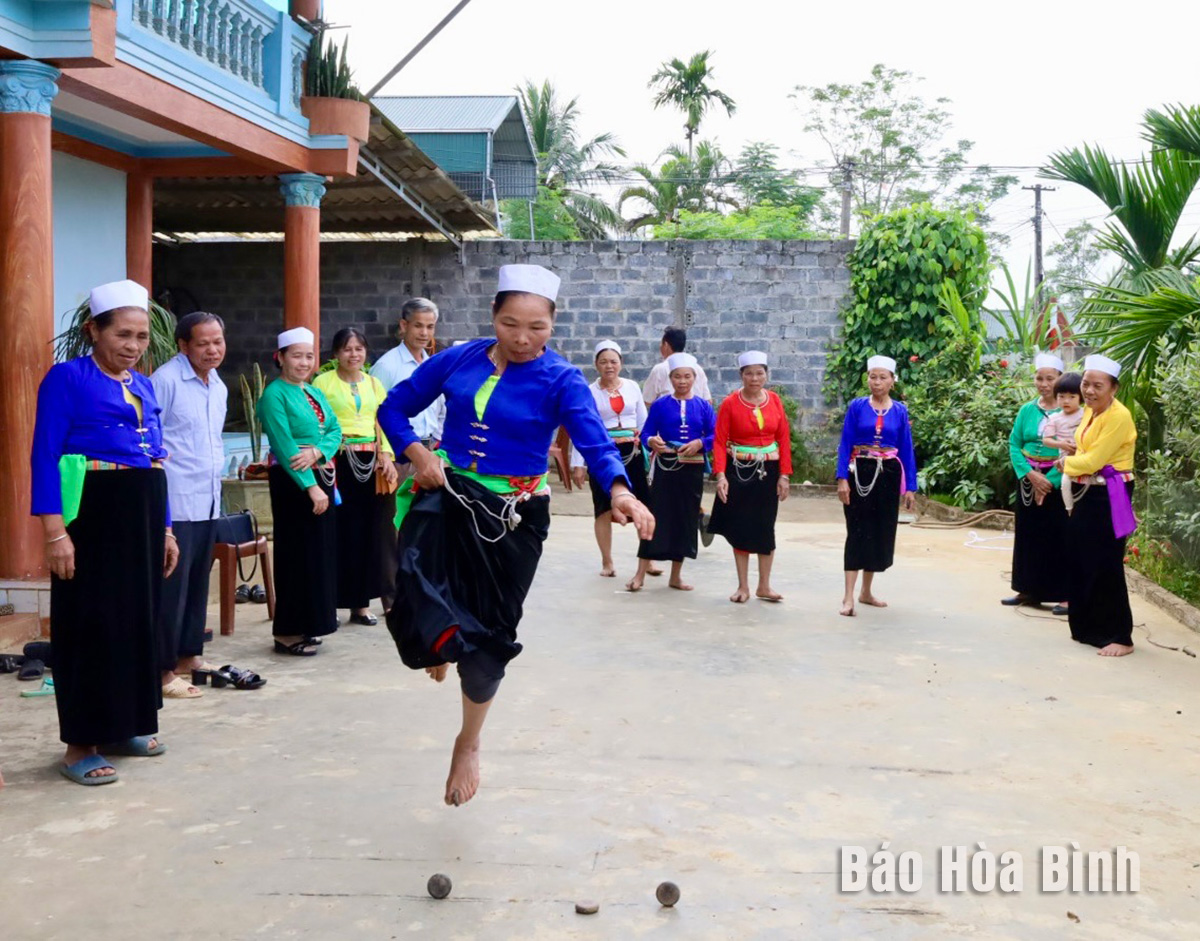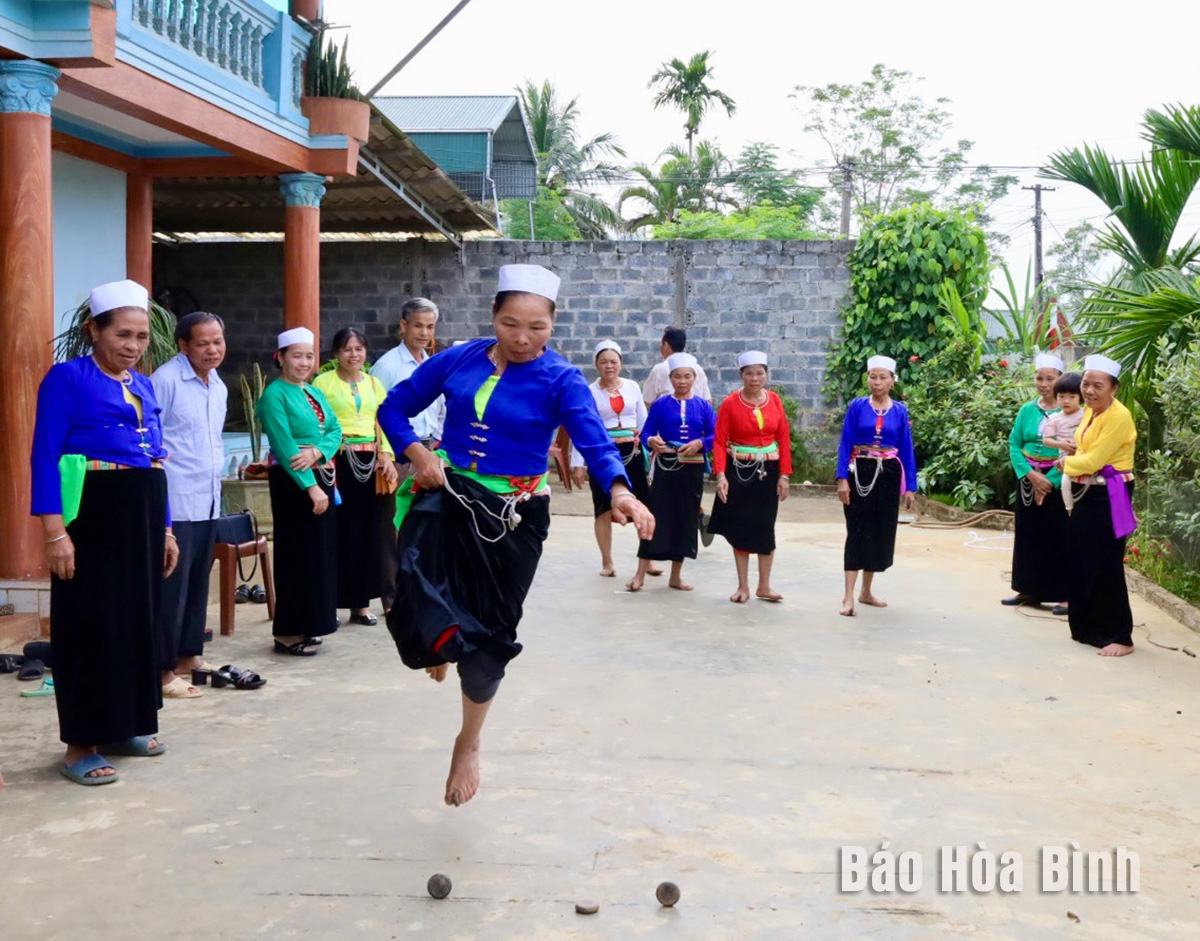
Lac Son district, home to an array of tangible and intangible cultural heritage items of the Muong ethnic group, has paid due attention preserving and promoting the values of their unique culture.

Muong ethnic
people in Tan My commune, Lac Son district, playing "danh mang” folk game.
Over
the recent years, nine traditional festivals in Vu Ban town and Ngoc Lau, An
Nghia, Van Son, Nhan Nghia, Vu Binh, and Yen Phu communes have been revived,
and various clubs established to preserve local folk songs and dances.
The
district arranges classes to teach the young generation to play Muong gong and
sing folk songs, and provides accessories and costumes for art teams and
members of the Mo Muong (folk performing genre in rituals) clubs under a
project on preserving and promoting traditional cultural values of ethnic
minority groups in tandem with developing tourism.
Besides,
it has digitalised information on five local historical and cultural relic
sites, namely Muong Khoi war zone revolutionary historical relic site, Khoi
communal house in An Nghia commune, Coi communal house in Vu Binh commune, Tay
Tien Regiment 52 relic site in Thuong Coc commune, and Khenh communal house in
Van Son commune. The district has organised sport competitions and cultural
exchanges to maintain the Muong ethnic group’s traditional and folk games.
To
date, Lac Son has completed the upgrade, renovation and embellishment of the
Muong Khoi war zone national relic site with some 8 billion VND (over 318,000
USD). It is working to complete a dossier asking for the provincial People’s
Committee’s approval for renovation projects for Khu Dung cave in Nhan Nghia
commune, Bang communal house in Ngoc Lau commune, and the anti-Japan Truong Son
guerrilla class in Tan My commune.
Most
recently, Trai hamlet cave in Tan Lap commune, and Vanh village stone cliff in
Yen Phu commune have been recognised as special national historical cultural
relic sites.
Head
of the district’s culture and sports office Nguyen The Hung said the district
has worked closely with the provincial Department of Culture, Sports and
Tourism to build a pre-historical culture museum in Tan Lap commune, and
studied and proposed the construction of a Muong ethnic cultural space in Yen
Phu commune.
With an increasingly vibrant and widespread emulation movement aimed at building cultured residential areas and cultured families, Yen Thuy District has been making steady progress toward improving both the material and spiritual well-being of its people, while fostering a civilized, prosperous, beautiful, and progressive community.
Once lacking recreational spaces and community facilities, Residential Group 2 in Quynh Lam Ward (Hoa Binh City) has recently received attention for the construction of a new, spacious, and fully equipped cultural house. The project followed the model of state support combined with public contributions in both labor and funding.
The "All people unite to build cultural life" movement, which has been effectively integrated with Kim Boi district’s socio-economic development goals, is fostering a lively spirit of emulation across local residential areas, hamlets, villages, public agencies, and enterprises. In addition, through the initiative, traditional cultural values are being preserved and promoted, while community solidarity and mutual support in poverty reduction and economic development are being strengthened.
A working delegation of the Hoa Binh provincial People’s Committee led by its Permanent Vice Chairman Nguyen Van Toan on June 11 inspected the progress of a project to build the Mo Muong Cultural Heritage Conservation Space linked to tourism services in Hop Phong commune, Cao Phong district.
Born and growing in the heroic land of Muong Dong, Dinh Thi Kieu Dung, a resident in Bo town of Kim Boi district, in her childhood was nurtured by the sweet lullabies of her grandmother and mother. These melodies deeply imprinted on her soul, becoming an inseparable part of her love for her ethnic group's culture. For over 20 years, this love for her hometown has driven Dung to research, collect, and pass down the cultural values of the Muong people to future generations.
In the final days of May, the Ethnic Art Troupe of Hoa Binh Province organized performances to serve the people in remote, mountainous, and particularly disadvantaged areas within the province. These were not just ordinary artistic shows, but they were the meaningful journeys aimed at spreading cultural values, enhancing the spiritual life of the people and contributing to the preservation of ethnic minority cultural identities.



